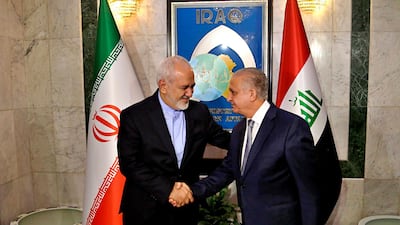The US must see Iraq as an independent state and not a “surrogate” Iranian nation, the former Iraqi foreign minister said on Tuesday before strategic talks between Baghdad and Washington.
Mohamed Al Hakim, who left the post this week, said Iraq was a sovereign country that did not want to be considered linked to Iran by western allies such as the US.
“We tried to let the US know that Iraq is not just a country tied to Iran, otherwise we will always have a stigma of getting the Iraqis associated with Iran,” Mr Al Hakim said during an online talk at the Atlantic Council think tank.
Iraq is key to the US strategy of stopping the Iranian regime expanding its influence in the region.
But the country has been stuck in the middle of tension between Washington and Tehran, a dangerous position for a state facing economic, financial and health crises as it battles the coronavirus pandemic.
The dispute between the two escalated this year after an American air strike killed Iranian military leader Qassem Sulemani in Iraq, days after supporters of a pro-Iranian militia tried to storm the US embassy in Baghdad.
Tehran has a network of proxy groups across the Middle East, using militias and political parties to undermine rival governments and movements.
Mr Al Hakim’s team sought to tackle the issue of getting “Washington to understand that Iraq wants to be distinguished by the relationship it has with the US and not through Iran".
After the US-led invasion of 2003 that toppled former dictator Saddam Hussein, Iraqi politics have been dominated by Shiite political parties, some of which are allied with Iran.
But Mr Al Hakim insisted that his ministry urged Washington that “Iraq is a country that has its own policies and strategic work, and that is why we are collaborating with the US and holding this dialogue".
US presence in Iraq is based on a strategic framework agreement signed in 2008.
It called for close defence co-operation to deter threats to Iraqi “sovereignty, security and territorial integrity".
The two will this week hold a strategic dialogue to put all aspects of US-Iraqi relations on the table.
It will include meetings between high-level officials and diplomats from both sides.
“What we need to make sure is we talk about what we signed in 2008 and adjust it going forward," Mr Al Hakim said.
"It will be a process. The first 15 minutes of the talks are crucial and will be based on how we should proceed.
“It's a comprehensive dialogue that has never stopped between the two sides."
The Iraqi team will go in with “concrete proposals that will be put on the table”, he said.
“We will listen to the Americans to see their proposals.
"The final output will be a communique to set a clear road map going forward.”


